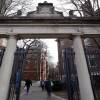Harvard University says it’s planning to repatriate a tomahawk belonging to 19th-century Native American civil rights pioneer Standing Bear.
But there’s no set date for the tomahawk’s return, and a descendant of Standing Bear, Brett Chapman, is reiterating his stance that the school should turn the relic over immediately.
In an interview with GBH All Things Considered host Arun Rath, Chapman made his case.
“They’re maintaining a proprietary interest in it by delaying it,” he said. “It doesn't need to be that bureaucratic.”
Standing Bear was among the first Native Americans to have their civil rights recognized by the U.S. government after a victory in federal court in 1879.
His tomahawk is in the collection of Harvard’s Peabody Museum of Archeology and Ethnology. A push for repatriation instigated by Chapman and first reported by GBH News led to plans, made public in May, for talks between the museum, the Ponca Tribe of Nebraska and the Ponca Tribe of Oklahoma.
While no date has been announced for the object's return, tribal representatives plan to visit Harvard in September for a viewing of the tomahawk and other artifacts associated with Standing Bear.
Larry Wright, Jr., chairman of the Ponca Tribe of Nebraska, told AP on Tuesday that the object’s promised return was an important symbol of homecoming for the tribe.
“That’s a piece of our history that represents who we are and why we’re here in Nebraska, so for it to be back home is very appropriate,” Wright said. “It tells that history and lets us never forgot what our people went through.”
Chapman said that he only speaks for himself and recognizes that other Poncas may be comfortable with the pace of the repatriation process.
“It’s important to remember, I'm just one person, one Ponca,” he said. “There’s thousands.”
Still, Chapman said that, to him, while Harvard may have good intentions, the fact that repatriation is playing out over the course of many months speaks to a deeper problem.
“It’s kind of a continuation of this type of systemic white supremacy, where you have an institution here that’s still maintaining control of this artifact from the little people, from people of color,” Chapman said. “It’s nice that they keep reiterating this intention to give it back, but it should have already been returned.”
A Harvard spokesperson declined to comment on Chapman’s call for immediate repatriation.








